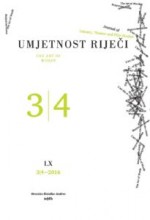The Representation of Minorities in Contemporary Croatian Film
The Representation of Minorities in Contemporary Croatian Film
Author(s): Krunoslav LučićSubject(s): Social differentiation, Film / Cinema / Cinematography, Ethnic Minorities Studies
Published by: Hrvatsko filološko društvo
Keywords: contemporary Croatian film; 1990s–2000s; minority figures (ethnic/national/sexual/racial/cultural); ideology; stereotypes; war trauma; representational procedures; acculturation;
Summary/Abstract: This paper focuses on the cultural stereotypes and various ethnic and sexual minorities in Croatian narrative film since 1990. Because 1990 marks a crucial break in the history of the Croatian cultural identity and the ethnicities of former Yugoslavia, the representation of minorities in the context of war and the postwar setting is an important indicator of transformation in the new society, and a gauge for observing its confrontation with a conflicted national heritage. The principal thesis establishes that the new society attempts to articulate its own identity through filmic representation, by negotiating diverse minority identities, which it ultimately conceives as a threat and a non-essential component, unable to be incorporated in the new social order. However, through exploring themes that were silenced prior to 2000, contemporary films give minorities a new voice and a strong visual path to recognition, which goes far beyond the previous stereotyped portrayals. In the period since 1990, a range of Croatian films has dealt with primarily ethnic/national minorities. Two trends are visible in this regard: an ethnic minority (particularly Serbian) that struggles for recognition in the context of war (e.g. in Vinko Brešan’s 2003 film Witnesses) or other ethnic minorities in the postwar context (e.g. an Asian child in Ognjen Sviličić’s 2004 film Sorry for Kung Fu). These two aspects often entwine, like in the film Fine Dead Girls (2002) by Dalibor Matanić, where a lesbian couple fights for recognition in a postwar Zagreb saturated with intolerance and war trauma.
Journal: Umjetnost riječi
- Issue Year: 2016
- Issue No: 3-4
- Page Range: 231-260
- Page Count: 30
- Language: English

